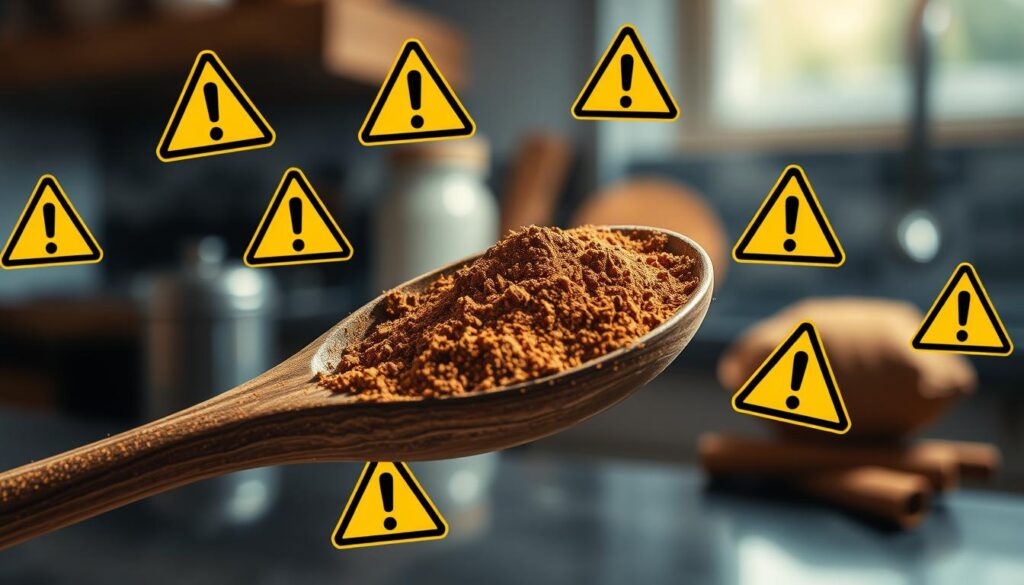Have you ever thought about why cinnamon is so special? It’s not just for its taste. It’s also packed with health benefits. From ancient times to today, cinnamon has been a treasure. This article will explore its health perks and uses.
Learn about cinnamon’s origins, what’s in it, and how it can boost your health. Discover the amazing differences between Ceylon and Cassia cinnamon. It’s time to uncover cinnamon’s secrets!
Key Takeaways
- Cinnamon contains about 19 calories per tablespoon, supplying 4 grams of fiber.
- Regular consumption of Ceylon cinnamon is considered safer due to lower coumarin levels.
- The active compound cinnamaldehyde in cinnamon can improve cholesterol levels.
- Research shows cinnamon plays a role in blood sugar regulation, beneficial for type 2 diabetes.
- Cinnamon is rich in antioxidants that can reduce oxidative stress linked to chronic diseases.
- Cassia cinnamon is often more affordable and readily available compared to the pricier Ceylon variety.
- In traditional medicine, cinnamon has been valued for its digestive and circulation benefits.
Introduction to Cinnamon
Cinnamon is a favorite spice worldwide, known for its unique taste and health benefits. It comes from the inner bark of certain trees. This spice adds warmth to both sweet and savory dishes. You might ask, what is cinnamon spice? It’s not just for flavor but also a source of nutrients that can boost your health.
When thinking about adding cinnamon to your meals, you might wonder, is cinnamon spice healthy? Studies show it can help control blood sugar and improve heart health.
The uses of cinnamon go beyond cooking. It has natural properties that scientists and health fans find interesting. From old medicine to new health tips, cinnamon has many uses that can make you feel better.
| Aspect | Description |
|---|---|
| Flavor Profile | Warm, sweet, and slightly spicy |
| Common Uses | Baking, oatmeal, smoothies, coffee, savory dishes |
| Health Benefits | May lower blood sugar, improve cholesterol levels, and act as an antioxidant |
| Types of Cinnamon | Ceylon (True Cinnamon) and Cassia |
The Origins of Cinnamon: Ceylon vs. Cassia

When it comes to cinnamon, you have two main choices: Ceylon and Cassia. Knowing the difference can change how you cook and what you choose for your health.
Ceylon cinnamon, also called “true cinnamon,” grows mainly in Sri Lanka. It has a mild flavor, perfect for fancy recipes and drinks. Its sticks are pale brown and layered, making them special.
Cassia cinnamon is more common in the U.S. It includes types like Indonesian and Chinese. It has a stronger taste, great for many dishes. Its sticks are darker and thicker, showing it’s different.
Health-wise, Ceylon cinnamon has much less coumarin than Cassia. Coumarin can harm the liver if you take too much. Studies say Ceylon cinnamon is safer to eat often.
So, if you eat cinnamon a lot, Ceylon is better for you. It has less coumarin and tastes more complex. But, Cassia should be eaten carefully because of its higher coumarin.
| Type of Cinnamon | Ceylon Cinnamon | Cassia Cinnamon |
|---|---|---|
| Origin | Sri Lanka | Southern China and other countries |
| Flavor Profile | Mild and delicate | Bolder and stronger |
| Coumarin Content | 0.004% | Approximately 1% |
| Common Uses | Delicate recipes and beverages | Sweet and savory dishes |
| Availability | Less common, found in specialty spice shops | Commonly available in supermarkets |
| Health Considerations | Generally safer | Use in moderation due to higher coumarin |
Cinnamon: A Spice with Potencial Health Benefits

Cinnamon has been used for thousands of years for health reasons. The ancient Egyptians used it for embalming and health benefits. Today, people are interested in its health benefits again.
Historical Significance of Cinnamon in Medicine
Cinnamon was valued for its health benefits in ancient times. People believed it had many advantages. It was used in herbal remedies and diets to improve health.
Cinnamon in Modern Science: Research Findings
Modern research shows cinnamon has many health benefits. It can lower bad cholesterol and improve blood sugar levels. Eating about 1.5 grams of cinnamon daily can help.
Studies also show cinnamon may help with neurological diseases. It has antimicrobial properties and might fight viruses like HIV-1. This makes cinnamon important for health today.
| Health Benefit | Research Findings |
|---|---|
| Cholesterol Reduction | Reduces triglycerides and LDL cholesterol. |
| Blood Sugar Management | Lowers fasting blood sugar and improves hemoglobin A1c. |
| Insulin Sensitivity | Enhances insulin response, beneficial for diabetes prevention. |
| Neurological Benefits | May influence neurotransmitter levels in Alzheimer’s and Parkinson’s models. |
| Antimicrobial Properties | Shows efficacy against bacteria like Listeria and Salmonella. |
| Potential Antiviral Effects | Indications of benefits against viruses like HIV-1 and influenza. |
Nutritional Profile of Cinnamon

Cinnamon is not just tasty; it’s also packed with nutrients. It’s a great addition to your meals. The nutritional benefits of cinnamon explain why it’s so popular. It’s full of minerals and compounds that make it special.
Caloric and Nutritional Breakdown
One teaspoon of cinnamon has very few calories but lots of good stuff. Here’s what you get:
| Nutrient | Amount per 1 teaspoon (2.6 g) |
|---|---|
| Calories | 6.42 |
| Carbohydrates | 2.1 g |
| Fiber | 1 g |
| Calcium | 26.1 mg |
| Iron | 0.21 mg |
| Magnesium | 1.56 mg |
| Potassium | 11.2 mg |
Cinnamon is full of fiber and minerals. It’s a great choice for healthy meals.
Key Compounds: Cinnamaldehyde and Polyphenols
Cinnamon has special compounds that are good for you. Cinnamaldehyde gives it a nice smell and has health benefits. Polyphenols in cinnamon are antioxidants that fight stress and inflammation.
Potential Health Benefits of Cinnamon

Cinnamon has many health benefits that can improve your overall well-being. Its special properties can help in several health areas. This makes it a great addition to your meals. Here are some key benefits of cinnamon.
Blood Sugar Regulation
Cinnamon is known for helping control blood sugar levels. Research shows it can make your body more sensitive to insulin. This is good for people with insulin resistance or type 2 diabetes.
It can also lower blood pressure a bit. This helps those who have trouble managing their blood sugar.
Anti-Inflammatory Properties
Chronic inflammation can lead to diseases like arthritis and heart disease. Cinnamon has compounds that stop the production of harmful inflammation. Knowing about cinnamon’s anti-inflammatory effects can help you stay healthy for longer.
Heart Health and Cholesterol Control
Cinnamon is good for your heart by lowering bad cholesterol and triglycerides. It might even raise good cholesterol. Eating cinnamon regularly can help keep your heart healthy and prevent heart disease.
Cinnamon’s Antioxidant Powerhouse
Cinnamon is full of antioxidants, thanks to polyphenols. These fight oxidative stress and lower disease risk. They also help balance gut bacteria, giving more reasons to add cinnamon to your diet.
| Benefit | Details |
|---|---|
| Blood Sugar Control | Improves insulin sensitivity, aids in blood sugar regulation. |
| Anti-Inflammatory | Reduces the production of pro-inflammatory cytokines. |
| Heart Health | Lowers LDL cholesterol and triglycerides; raises HDL cholesterol. |
| Antioxidant Effects | Contains polyphenols that combat oxidative stress. |
| Gut Health | Possesses prebiotic properties that help restore gut flora. |
How to Use Cinnamon in Your Diet

Adding cinnamon to your meals can make them taste better and be healthier. This spice is great for many dishes, making it easy to add to your diet.
- Sprinkle on Oatmeal: Begin your day with cinnamon on your oatmeal. It adds flavor and might help control blood sugar.
- Add to Baked Goods: Cinnamon is wonderful in cookies, muffins, or bread. It enhances taste and adds a nice aroma.
- Blend in Smoothies: Add cinnamon to your smoothies. It goes well with bananas and apples, boosting nutrition.
- Season Savory Dishes: Use cinnamon in stews or curries. It makes your favorite dishes even better.
- Mix into Yogurt: Mixing cinnamon into yogurt or cottage cheese improves taste and health benefits.
- Create Cinnamon Infusions: Try cinnamon-infused water or tea. It’s refreshing and good for you.
There are many ways to use cinnamon in your diet. You can add it to meals and snacks all day. Enjoy the flavors and health perks it brings.
Unique Applications: Cinnamon Infused Herbal Teas

Cinnamon-infused herbal teas are a great way to enjoy the cinnamon herbal tea benefits. They not only taste warm and delicious but also have lots of antioxidants. Drinking these teas can help with digestion and boost your immune system.
Cinnamon Tea Benefits
Drinking cinnamon tea can offer many health benefits. Here are some of the main advantages:
- Antioxidant effects: Cinnamon’s polyphenols fight oxidative stress.
- Digestive support: It can ease digestive issues and improve gut health.
- Blood sugar regulation: Cinnamon tea may help control blood sugar, good for type 2 diabetes.
- Anti-inflammatory properties: Its compounds may reduce inflammation and support heart health.
Popular Cinnamon Tea Recipes
Making your own herbal teas with cinnamon is a fun way to add it to your diet. Here are some simple recipes with cinnamon tea:
- Classic Cinnamon Tea: Steep one cinnamon stick and one teaspoon of loose black tea in boiling water for 10 minutes. Add honey and a lemon slice for sweetness.
- Cinnamon Apple Infusion: Mix one chopped apple, a cinnamon stick, and two cups of water. Simmer for 15 minutes, then strain and enjoy warm or iced.
- Cinnamon Ginger Tea: Boil water with a thumb-sized piece of ginger and one cinnamon stick. Let it steep for 10 minutes, then add honey for sweetness.
Important Considerations for Cinnamon Consumption

Cinnamon has many health benefits. But, it’s important to think about how much we eat. Knowing the difference between Cassia and Ceylon cinnamon is key. Also, eating cinnamon in moderation is important to avoid health problems.
Cassia vs. Ceylon: Health Implications
Cassia cinnamon, common in the U.S., has more coumarin than Ceylon cinnamon. Ceylon, or true cinnamon, is safer for daily use because it has less coumarin. Here’s a comparison:
| Cinnamon Type | Coumarin Content | Health Risks |
|---|---|---|
| Cassia | Higher | Potential toxicity for liver issues if consumed excessively |
| Ceylon | Trace amounts | Generally safe for daily consumption |
Moderation and Side Effects of Cinnamon
Cinnamon is good for us, but we should only eat a little. Most adults can safely eat up to 1 teaspoon (2-4 grams) a day. Eating too much, like Cassia cinnamon, can harm the liver, even more so for those with health issues.
If you have health problems or take medicine, talk to a doctor first. Knowing how to safely eat cinnamon helps us get its benefits without risks. Eating cinnamon in small amounts is the safest way to enjoy it.
Conclusion
Cinnamon is more than just a spice; it’s a powerful ingredient with many health benefits. Knowing where it comes from and what it does helps you use it wisely in your meals. From ancient medicine to today’s science, cinnamon’s benefits are impressive.
This spice can help your body in many ways, like making insulin work better, improving digestion, and boosting brain function. You can add it to tea or oatmeal, making your food taste great and helping your health.
Remember, too much of a good thing can be bad. Stick to the right amount to enjoy cinnamon’s benefits safely. Let cinnamon spice up your cooking and health routine at the same time.

